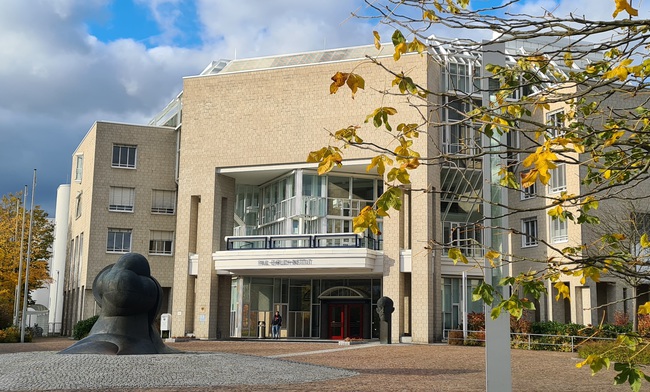From Hessian Testing Authority to Internationally Active Federal Institute for Vaccines and Biomedicines – a Look Back

With the entry into force of the "Act Establishing a Senior Federal Authority for Sera and Vaccines" – known as the Establishment Law – on 1 November 1972, the Paul-Ehrlich-Institut, the former Hessian testing authority for medicines, became a higher federal authority within the health ministry of the Federal Government and subordinate to the Federal Ministry of Health (BMG). The Institute itself was founded in 1896 as Institute for Serum Research and Serum Testing in Steglitz, near Berlin.
The Act Establishing a Senior Federal Authority for Sera and Vaccines amended the Medicinal Products Act of 16 May 1961 to the effect that sera and vaccines could only be placed on the market if they had been authorised by the Paul-Ehrlich-Institut. As the Federal Institute for Vaccines and Biomedicines, the Paul-Ehrlich-Institut has been carrying out a wide range of tasks in Germany and Europe for 50 years now. The Institute’s tasks are related to the marketing authorisation process and research in the areas of immunological veterinary medicinal products and human vaccines and biomedicines. The Paul-Ehrlich-Institut takes the anniversary of its designation as a higher federal authority as an opportunity to highlight the most important steps in the Institute's development over the past 50 years.
From the Beginnings of the Federal Agency for Sera and Vaccines
In 1972, the main tasks of the Paul-Ehrlich-Institut were research and the authorisation and federal batch testing of immunobiological human and veterinary medicines in Germany. Its priorities were recording and evaluating adverse drug reactions, coordinating the adoption of risk-reducing measures, and organising the participation of Institute experts in the monitoring of the medicinal products market by the competent German state authorities.
The Establishment Act defines authorisation and research as official tasks of the Institute. This combination of research and pharmaceutical regulation is still a unique characteristic of the Paul-Ehrlich-Institut in the EU. Due to its diverse tasks in the field of medicines testing and assessment and its responsibility for a variety of established and innovative drug classes, this combination also provides a crucial foundation for the Institute's performance and regulatory leadership role. The combination of regulation and research makes it possible for its employees to have up-to-date expertise regarding the current state of research and science and ensures efficient promotion of innovation, protection of the population against avoidable drug risks and a positive benefit-risk assessment of authorised drugs.
The Federal Agency Becomes the Federal Institute – the Range of Tasks Becomes Diverse and Complex
The Federal Agency of Sera and Vaccines received a new function designation with the 15th amendment of the Medicinal Products Act in 2009: it became the Federal Institute for Vaccines and Biomedicines. The term 'biomedicines' outlines the spectrum of biological drugs for which the Paul-Ehrlich-Institut is responsible as the higher federal authority. These include vaccines for humans and animals; immunological veterinary medicinal products, such as immunologically active veterinary advanced therapy medicinal products (ATMPs) and animal allergens and medicinal products containing antibodies for the treatment of human diseases; monoclonal antibodies and their derivatives; blood stem cell preparations and other medicinal products derived from blood; allergens; tissue preparations; blood stem cell preparations, and ATMPs. The Paul-Ehrlich-Institut's research in the fields of virology, microbiology, immunology and allergology, haematology, pharmacoepidemiology and cell and gene therapy supports its decisions in the marketing authorisation process and in its evaluation of drugs.
Innovation Catalyst in Vaccines and Biomedicine
Fifty years after the Hessian testing authority became a federal institute, its tasks have grown beyond national borders – the Paul-Ehrlich-Institut operates worldwide and its expertise is internationally recognised. The Institute is the EU's leading pharmaceutical authority in the field of vaccines and biomedicines and it is highly regarded within the international scientific community. Through flexible regulatory work, a pragmatic approach and well-informed decisions, the Paul-Ehrlich-Institut encourages breakthrough innovations in vaccines and biomedicines. Targeted regulatory support in the process of translation, i.e., in the conversion of fundamental research results into drug concepts, plays an important role. Innovative, safe and effective medicines must be tested promptly and in a controlled manner so that they are available to patients and those wishing to be vaccinated as soon as possible. The importance of this process was recently demonstrated in the SARS-CoV-2 pandemic triggered in 2019.
The Paul-Ehrlich-Institut has always supported the development of innovative medicines and contributes significantly to the quality, safety and efficacy of vaccines and biomedicines and thus to the protection of public health with its regulatory expertise and research work.
Infographic



